CONTENTS
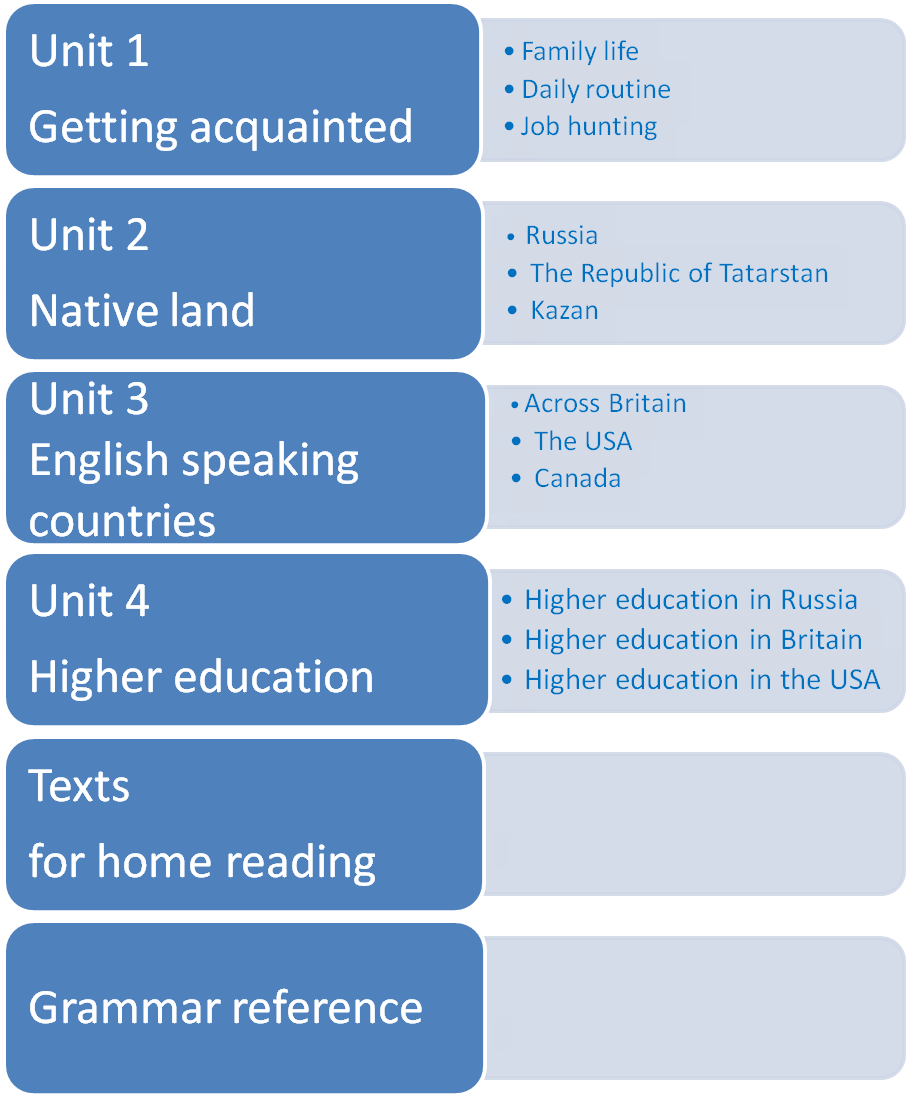
UNIT 1
GETTING ACQUAINTED
Module 1 Family Life
P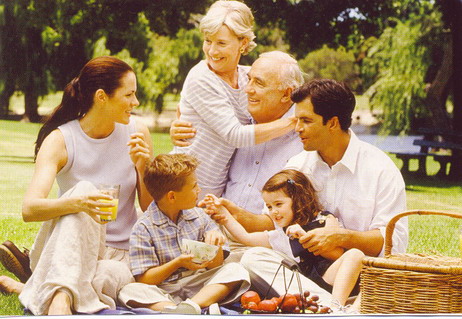 REVIEW REVIEW
Look at the picture and answer the questions below.
Who are those people in the picture?
Do they know each other?
Why do you think so?
How are they related to each other?
Can you predict their relationships?
6) Is it difficult for you to start a talk with an unknown person?
Which of the following happens to you for the first time when you meet someone?
I talk too much because I am nervous.
I don’t speak at all because I can’t think of anything to say.
I smile a lot so that the other person likes me.
I act in exactly the same way as I would with a person I know.
Can you remember when and where you met some of the following people for the first time?
A very good friend
A girlfriend/ a boyfriend
|
|
LANGUAGE SKILLS 1: STARTING A CONVERSATION
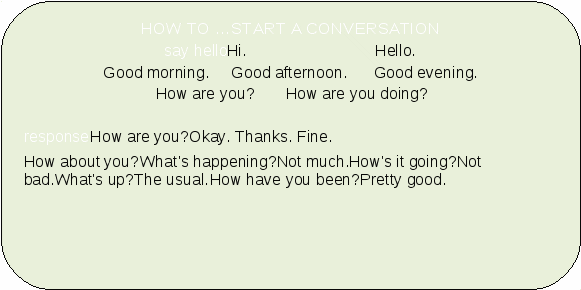
A. When you start a conversation try to reply in a way that develops the conversation. Match the question with an appropriate reply.
-
How are you?
|
Thanks. I bought it from Harrods.
|
Nice to see you again.
|
Yes, I think we last met two years ago in Manila.
|
It's been a long time, hasn't it?
|
Yes, awful. I think it's rained every day since I arrived.
|
Nice weather today, isn't it.
|
Fine thanks. And you? You're looking well.
|
Terrible weather isn't it.
|
Yes, I did thanks. It was very useful.
|
That's a nice shirt/blouse.
|
Yes, it is, isn't it? Not like the coffee you get in Italy.
|
This coffee's a bit weak.
|
Yes, lovely. I hope it stays like this for the weekend.
|
Did you get that mail I sent you?
|
Nice to see you too. How are you?
|
B. Now try to go around a class, greet and start a conversation.
LANGUAGE SKILLS 2: INTRODUCING YOURSELF & PEOPLE
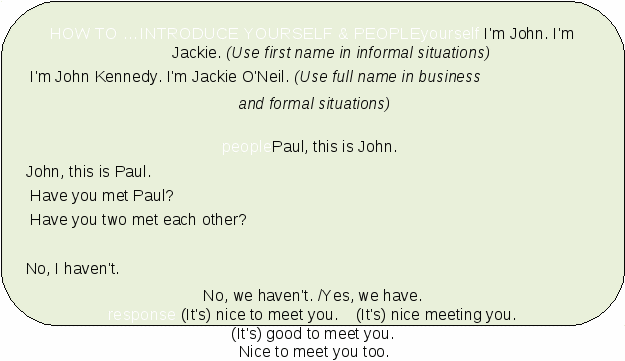
C. Practice introducing yourself, friends and groupmates. Remember to smile (and use handshakes where appropriate).
After you have been introduced to someone, it is polite to ask a few general questions to get acquainted. For example:
Where are you from, Carol?
I'm from Connecticut.
Connecticut, which part?
Hartford, the capital. How about you, Ben?
Nebraska - a place called Bellevue. It's near Omaha.
How do you know Alan (A)?
He is my friend from college.
When meeting someone for the first time, it is not appropriate to ask certain types of questions. Do NOT ask: A person's age, Birth date, Salary, Weight, Marital status. You may ask general questions about the situation. For example:
How do you know Alan (the person who introduced us)?
Are you a student at this university?
Is this your first time here?
What do you do for a living?
How long have you been working for (company)?
LANGUAGE SKILLS 3: CLOSING A CONVERSATION
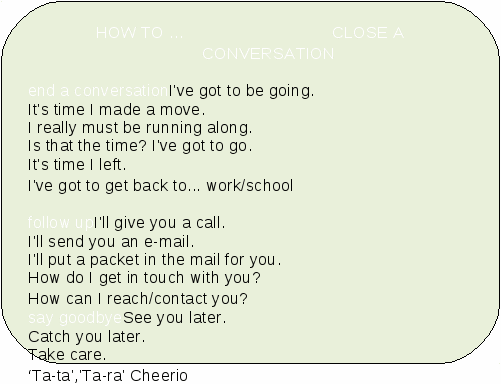
D. How would you close a conversation in the following situations?
You are in a hurry to leave. What do you say?
You really don't want to leave, but you can see the other person needs to go.
You’ve just met someone at a party, but you have to leave the party early.
You are "seeing someone off" at the airport/train station.
E. A host (H) and a guest (G) are sitting in the airport lounge after a successful business meeting. Role-play the dialogue according to the model given below.
G: Start a 'leaving' dialogue
H: Reply to the guest
G: Say why you must leave
H: Show interest in the guest’s plans
G: Give more information
H: Make a final reference to business
G: Thank the host for his/her help
H: Reply - say it's been a pleasure
G: Make a second reference to leaving
H: Wish the visitor a good trip and send your regards to someone
G
Revise new vocabulary after one hour. Revise it again after one day and again after one week. Most people need to see or hear new vocabulary at least six times before they can remember it!
Tell your classmates about the different ways that you revise vocabulary.
: Refer to the next meeting and say goodbye.
VOCABULARY 1: JOBS
Match professions with their definitions.
Professional people
architect
|
teaches in a university
|
lawyer
|
plans for buildings of roads, bridges, machines, etc
|
engineer
|
controls the financial situation of people and companies
|
accountant
|
designs buildings
|
university lecturer
|
buys and sells stocks and shares
|
broker (stock market)
|
works for the government
|
civil servant
|
represents people with legal problems
|
Medical professions
doctor
|
animal doctor
|
nurse
|
operates on people
|
surgeon
|
gives medical treatment and tries to solve medical problem
|
dentist
|
helps people to solve personal problems
|
vet
|
practices dentistry
|
psychologist
|
looks after and takes care of others
|
Manual jobs(these jobs are done with hands and all the examples given
below are skilled jobs and need a lot of training)
bricklayer
|
makes things using wood
|
carpenter
|
repairs cars
|
plumber
|
fits and repairs electrical things
|
electrician
|
builds walls
|
mechanic
|
fits and repairs water pipes, bathrooms etc.
|
Armed forces and emergency services
soldier
|
serves in the navy
|
sailor
|
is in the police service
|
pilot
|
works in the fire brigade
|
police officer
|
serves in the army
|
firefighter
|
flies the aircraft
|
Write down at least one job from the list that would probably be impossible for these people.
Someone who didn’t go to the university
Someone with very bad eyesight (cannot see very well)
Someone who is always seasick on a boat
Someone who understands nothing about cars.
Someone who will not work in the evening or at weekends.
Someone who is afraid of dogs.
Someone who is afraid of heights and high places.
Someone who is terrible at numbers and figures.
Someone who can’t stand the sight of blood.
Someone who is a pacifist, who is anti-war.
You have just bought a piece of land and you are planning to build a house on it. Write down at least six people that you may need to help you. What would you need their help for?
VOCABULARY 2: FAMILY & FRIENDS
Discuss.
Where were you born and brought up?
Who is the core of your family?
How many people form a family?
What’s the ideal age to start up a family life?
Does any ideal family exist?
Study the following.
Relatives = members of your family
|
male
|
female
|
Your parents' parents
|
grandfather
|
grandmother
|
Your parents' brother and sister
|
uncle(s)
|
aunt(s)
|
Your aunt's/uncle's children
|
cousin(s)
|
cousin(s)
|
The father and mother of the person you marry
|
father-in-law
|
mother-in-law
|
The brother and sister of the person you marry
|
brother-in-law
|
sister-in-law
|
Your brother's/sister's children
|
nephew(s)
|
niece(s)
|
The person you marry dies, so you are a ...
|
widower
|
widow
|
Your mother or father remarries, so you have a…
|
step-father
|
step- mother
|
Family background = family history
My grandfather was a market gardener in Ireland. He grew flowers, fruit and vegetables, and sold them in the market every day. He worked hard all his life, and when he died, his son (now my uncle) and daughter (my mother) inherited a large house and garden (= received this house and garden from my grandfather when he died). They carried on the business together until my mother met my father. He wasthree yearsher senior. (She was 3 years junior to him). They got married, moved to England, and I was born two years later. They didn't have any more children, so I am an only child.
Family names
When you are born, your family gives you a first name, e.g. James, Kate. Sarah and Alex are common first names in Britain. Your family name (also called your surname) is the one that all the family sharee.g. Smith, Brown, Jones, and O'Neil are common surnames in Britain. Some parents give their children a middle name(like a first name), but you do not usually say this name. Your full name is all the names you have, e.g. Sarah Jane Smith.
Changing times
Society changes and so do families. In some places, people may decide to live together but do not get married. They are not husband and wife, but call each other their partner. There are also many families in some parts of the world where the child or children live(s) with just their mother or father; these are sometimes tailed single-parent families.
Friends
We can use a number of adjectives before friend:
an oldfriend (= someone you have known for a long time)
a close friend (= a good friend; someone you like and trust)
your best friend (= the one friend you feel closest to)
We use the word colleaguesto describe the people we work with.
Ex-
We use this for a husband/wife/boуfriend/girlfriend we bid in the past but do not have now: The children stay with my ex-husband at the weekend. I saw an ex-girlfriendof mine at the disco last night.
Look at the family tree and complete the sentences below.
Albert & Mary Dodds
   
J      ohn = Susan Jill = Paul (died 1995) Barry = Sheila ohn = Susan Jill = Paul (died 1995) Barry = Sheila
Eve Ana Timothy Tom
John is Jill's …
Timothy is Jill's …
Eve and Ana are Timothy's…
Eve is Sheila's …
Albert Dodds is Tom's …
|
Barry is Eve's …
Susan is Timothy's …
As Paul died in 1995, Jill is a …
Tom is Mary's …
10) The only two people who are not related are…and….
|
Correct the mistakes.
My full name is Katy.
Unfortunately my family is full, I live with my mum only.
There are so many helpful close friends in my office.
My partner (the man I got married with) has brought a wonderful bucket of flowers on our anniversary.
I divide the flat with my brother.
I’ve got a niece, son of my brother, who we name John.
We have so many best friends working with the hospital that I had to become a doctor.
His wife died last year so he is an ex-husband now.
She is my senior, so she does what she’s told.
As their uncle had no other relatives they were granted the house after his death.
PHRASAL VERBS
Work with a partner. What is a phrasal verb? What makes it different from other verbs? Choose the correct alternative to complete the sentences.
I grew up/down in Brazil.
The children were brought down/up by their aunt.
My brother always told me off/on for borrowing his records.
You really take before/after your father. You are always complaining.
My sister looked after/before me when I was ill.
I don’t get on/off very well with my mother.
I still look down/up to my older brother, and ask him for advice.
We carried off/on arguing until they left home.
Use the sentences in Ex. A to help you match the phrasal verbs from A with the definitions from B.
A
|
B
|
to grow up
|
to admire and respect someone
|
to bring up
|
to continue (doing something)
|
to tell (someone) off
|
to develop from being a child to being an adult
|
to take after (someone)
|
to take care of (someone or something)
|
to look after (someone or something)
|
to talk angrily to someone because they have done something wrong
|
to get on with (someone)
|
to have a friendly relationship with someone
|
to look up to (someone)
|
to look or behave like another member of your family
|
to carry on (doing something)
|
to care for children until they are adults
|
Complete the text using the correct form of the phrasal verbs in Exercise B.
I was brought up in a small town near Paris. My parents are English, so I (1) speaking English and French. A young English student lived with us during the school holidays, and she (2) me when my parents were away on business. I remember my father always (3) us (4) in English when he couldn’t hear us, because it was easier for both of us. She was an artist and we (5) very well. I (6) her, and later tried to become a painter myself. Unfortunately, I (7) my father, who wasn’t artistic, and so I was never successful.
D. Answer these questions about yourself and your region.
What is your first name? What is your surname? Is that a common name in your region?
Are you an only child?
Where did you grow up?
Who is your oldest friend?
How many of your ex-classmates are still your friends?
As a child, did anyone tell you off? Why? Did this make you stop or did you carry on anyway?
Which member of your family do you get on with best?
Who in your family do you take after?
Who looks after you when you are ill?
As a child, who did you look up to?
Are single parent families becoming more common in your region?
In your region, do more and more people live together without getting married?
When you bring up a child, what do you think is the most important thing to teach him/her?
E. Draw your own family tree and write a short summary of your family background.
READING: MODERN FAMILIES
Who do you live with? Do other members of your family live near you, or do you have to travel to see them?
Match the words to the definitions.
to get divorced
divorce n
|
someone that is married to one of your parents, but isn't your parent
|
second wife/second husband
|
to (make something) become larger in amount or size
|
step mother/stepfather
|
legally end someone’s marriage (the legal ending of a marriage)
|
half-sister/half-brother
|
having qualities that are typical of most people or things
|
to go to see
|
two people who are married or in a romantic or sexual relationship, or two people who are together for a particular purpose
|
suburbs (in the suburbs)
|
a flat
|
average
|
the outer area of a town, rather than the shopping and business centre in the middle
|
apartment
|
to visit
|
couple
|
someone that you marry when you have already been married to someone else before
|
to increase
|
someone who has the same mother, or the same father, as you, but not both parents
|
C. Read the text and find out how many people Callum, Meera, Веn and Trudy share a house with.
Modern families
What is a "traditional" family nowadays? With more and more couples choosing not to get married, and with the number of divorces and second marriages increasing, the idea of the "traditional family" (two married parents, an average of two children, grandparents living nearby) is rapidly disappearing in some countries.
Here are some stories of people around the world telling about their families.
I'm Callum, and I live with my parents in Cambridge, in the east of England. We moved here when I was five because of Dad's job, but my mum comes from the north of England, and Dad comes from Scotland I've got a grandma in Edinburgh and a granddad in Yorkshire. And I've got two cousins who live near London, because that's where Dad's sister and her husband live. We see my cousins about three times a year, and we go up to Edinburgh every New Year, but I can't remember when I last saw my granddad in Yorkshire. He always sends me presents, though!
Mу name's Meera, and I live in Wolverhampton, near Birmingham, in England. I live with my parents, my brother and my sister. My grandmother lives next door. My mum was born here in Britain, but my grandmother moved here from India in the 1960s when my dad was a little boy. My dad has two sisters - Auntie Sunita and Auntie Rani. Auntie Sunita lives in the same street as us, and Auntie Rani lives in Birmingham, which is only 15 miles away. They're both married, and I've got five cousins. We see them almost every week. Someone is always visiting our house, or we go to Birmingham to see them. And two years ago we all went to India to see our family there.
I`m Ben, from Portland, Oregon, and my family is a bit complicated! I've got a sister called Ella, but three years ago my parents got divorced and now both of them are re-married. We live with my mom, Julie, and my stepfather, Bob. Bob's got a daughter called Daisy, but she doesn't live with us, she lives with her mom. My father's name is Pete. He and his second wife have just had a baby boy, Charles, so I've got a new half-brother!
May name's Trudy and I've got a sister called Beth. Our mum and dad are divorced,so we live with just our mum in the suburbs of Melbourne, Australia. Our dad has an apartment in the centre of town, and we spend every other weekend there. After school every day we go to our grandma's house and have a meal there, because our mum doesn't finish work until six o'clock. She collects us at half past six, except on Wednesday evenings when we go swimming with our dad.
D. Underline the correct alternatives to complete the sentences.
Callum's aunt and uncle/grandparents live near London.
Callum often/sometimes sees his cousins.
Meera's aunts both live near/far away.
Meera often/rarely sees her cousins.
Daisy is Ben's half-sister/stepsister.
Julie is Pete's ex-wife/stepmother.
Trudy’s mum and dad live in different places/together.
Trudy never sees her dad/sees her dad regularly.
E. Translate sentences into English using underlined words from the text.
Они были такой красивой парой, очень жаль, что они развелись.
Так как мой друг живет по соседству, мы часто ходим в гости друг к другу.
Я навещаю бабушку трижды в неделю, потому что она живет всего лишь в 100 километрах от Казани.
В пригороде Уфы открылся новый центр семейного досуга, куда мы ходим каждые выходные.
После развода мой сводный брат остался жить с отчимом.
В нашей группе в среднем по одному ребенку в семье.
Вторая жена моего отца переехала в Питcбург, откуда она родом.
После учебы мы ходим домой вместе, поскольку живем на одной улице.
SPEAKING
Read the statistics about families in the USA and the UK. How do you think the same statistics would be different in Russia?
What’s your opinion of the current situation with the family life in our country? Is it different from the situation twenty years ago? If yes, what are the possible reasons for that? And how could it be changed?
Families
|
in the USA
|
in the UK
|
in Russia
|
Marriages that end in divorce
|
50%
|
33%
|
|
Families with only parent
|
25%
|
25%
|
|
Children who live in a single-parent home at some time
|
50%
|
33%
|
|
Children whose parents aren’t married
|
33%
|
40%
|
|
Single parents who are men
|
10%
|
10%
|
| |
 Скачать 18.07 Mb.
Скачать 18.07 Mb.
 REVIEW
REVIEW











 ohn = Susan Jill = Paul (died 1995) Barry = Sheila
ohn = Susan Jill = Paul (died 1995) Barry = Sheila